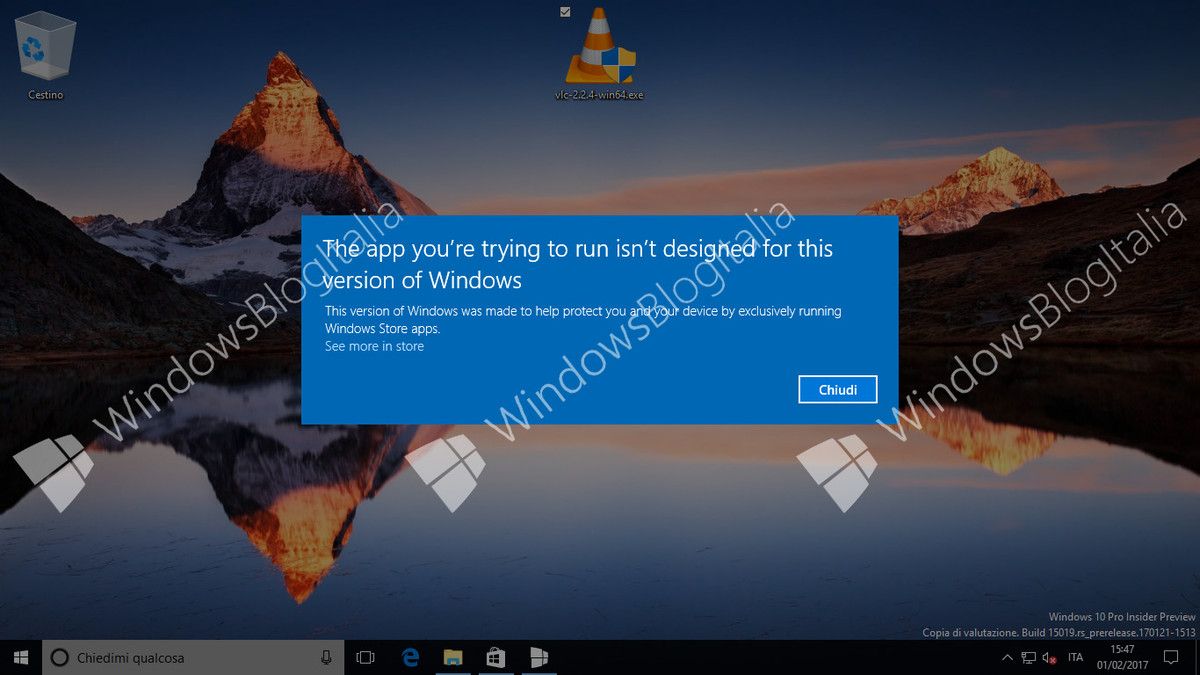Windows 10 CloudBooks are coming: will Chromebook users be swayed?

Screenshots have leaked of a recently rumored version of Windows 10, namely “Windows 10 Cloud”, whose name was retrieved from within the latest preview builds released to Windows Insiders.
Tech site Windows Blog Italia has the exclusive on the leaked screenshots, featuring a Windows 10 desktop view very similar to the regular version, but allegedly restricted to running Universal Windows Platform apps from the Windows Store.
Anybody with a recollection of what happened with the Surface 2 tablet in 2012, will remember the controversy that surrounded Windows RT, an operating system derivative of Windows 8, also restricted to Windows Store apps.
At the time, a cloud-based/apps-centric device like the Surface 2, was way too ahead of its time, considering that cloud apps were still rather unpopular, up until Google turned all of its services into a unified suite of free productivity tools, and built a cloud-based operating system around it, and finally, used it to power ultralight, and ultra-cheap netbooks, causing havoc among laptop manufacturers, due to a near-instant mass popularity of the new devices.
Not nearly five years later, Microsoft is about to have another go at making cloud-based devices, starting from a brand new variant of Windows 10, which has a lot more in common with Chrome OS than it has with Windows 10.
Obviously, this comes from Microsoft learning a lesson or two about how to create a great netbook.
According to the screenshots gathered by Windows Blog Italia, Windows 10 Cloud seems to look exactly like the regular Windows 10 running on your average laptop, except that it’s capable of running only Windows Store apps, and some Win32 apps, on an ARM chip.
The operating system will come with a considerably lower licensing cost than the regular Home edition, and will run on devices within a price range that is expected to aggressively compete with Chromebooks.
There is no word on the name of the device to host Windows 10 Cloud, but so far, “CloudBook” sounds like a fitting option, and one that would resonate with consumers looking for more flexible, and desktop-like alternatives to Chrome OS, outside of Google’s ecosystem.
It goes without saying that Cortana and OneDrive will be central to Windows 10 Cloud, as well as MS Office, whose light version is available for free, for those who are looking for alternatives to Google apps like Docs, Sheets, and Slides, as well as integration and synchronization with their files on other Windows 10 devices, through Continuum, the Microsoft alternative to Apple Continuity, which lets Windows 10 users start working on one device, and continue working on the same file, on a different device, from where the user left off.
The one advantage of Windows 10 Cloud over Chrome OS will be support for Win32 apps, which means that many desktop applications will be able to run on Windows 10 Cloud, as long as the hardware permits it.
By this token, using Photoshop, Illustrator, or other hardware-intensive programs might be out of the question, as well as playing many high-end gaming titles from Xbox or Steam, with that said, considering that a “CloudBook” will be within reach of many consumers on a budget, the limitations could be something that users will be prepared to bear with, and even enjoy a simpler level of computing.
It’s also possible that Windows 10 Cloud users will b e able to easily set family restrictions for younger users, which would make these devices ideal for children, as an alternative to iPads and Android tablets, where they can interact with a more desktop-like environment.
Ready to shop?
If you are looking for the ultimate Windows 10 tablet, PortableOne has the best deals on Surface Pro 3 and Surface Pro 4, as well as a full range of accessories.